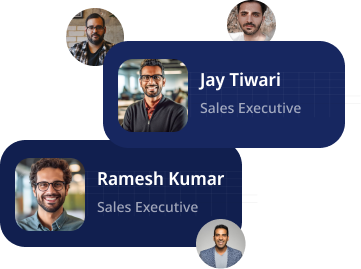Upgrade, modernize, and scale your web and mobile apps with ValueCoders’ Application Migration & Modernization services. We offer on-premise, hybrid, and cloud-based solutions across various platforms, ensuring seamless and efficient application performance.
Get free consultation and let us know your project idea to turn it into an amazing digital product.

Software migration and modernization are crucial in a dynamic market condition. At ValueCoders, we develop an incremental development roadmap for application migration & modernization.

We review your business’s existing applications and suggest if any OS updates or system migration is required.
We provide UI modernization & migration to maintain a consistent UX across smartphones, tablets, laptops and desktops.
Migration between one platform to another, one technology to another and one domain to a different one.
Being a top digital transformation company, we give your business a digital forefront by providing advanced app migration & modernization services to each industry vertical.
We work on your legacy applications and migrate them to the cloud per your business requirements. Our legacy application migration services include:
We provide API migration services. Be it a data transfer from website APIs to mobile APIs, different web APIs to host APIs or the upgradation of APIs, our team caters to all.
Access to our hands-on development expertise to increase your core business system efficiency and reduce technical debt.
We help organizations modernize their existing applications by giving recommendations and making a roadmap for a more modern and efficient workflow.
We revitalize legacy applications using languages and platforms like PowerBuilder, Delphi, VB, C++, and COBOL, or technologies like older Java and .NET versions. We use modern languages, frameworks, and databases for up-to-date, high-performing applications
Drop us a line and we'll get back to you immediately to schedule a call and discuss your needs personally.


Application migration and modernization are two distinct concepts in the field of software development:
Application Migration: Application migration refers to the process of transferring an application from one environment to another.
It involves moving an application from an older or outdated infrastructure, platform, or technology stack to a new environment that offers better performance, scalability, security, or cost-efficiency.
Migration can involve transferring an application from on-premises servers to the cloud, moving from one hosting provider to another, or transitioning to a different operating system or database.
Application Modernization: Application modernization, on the other hand, focuses on upgrading or transforming an existing application to leverage new technologies, enhance functionality, improve user experience, and align with current business needs.
Modernization aims to extend the lifespan and value of an application by adopting modern development practices, architectures, and frameworks.
It may involve rewriting or refactoring code, redesigning the user interface, optimizing performance, integrating new features, adopting cloud-native technologies, or implementing microservices architecture.
In summary, application migration involves moving an application from one environment to another, while application modernization involves updating and improving an application to meet current technological and business requirements.
Both processes can be undertaken to enhance applications’ performance, scalability, security, and longevity.

There are several types of application migration, each catering to different scenarios and requirements:
Lift-and-Shift Migration: This type of migration involves moving an application as-is from one environment to another without making significant changes. It often involves transferring applications from on-premises infrastructure to the cloud or between different hosting providers.
The focus is on achieving better scalability, cost-effectiveness, and management convenience without altering the application’s core functionality.
Replatforming: Replatforming migration involves making minimal modifications to an application during the migration process. It typically involves moving the application to a new platform or infrastructure that offers improved capabilities or better support. For example, migrating from an older database version to a newer version or moving from a legacy server to a container-based environment.
Refactoring: Refactoring migration involves making significant changes to the application’s architecture, design, or codebase while migrating to a new environment. The goal is to optimize the application for the target platform, improve performance, scalability, or maintainability, and adopt modern development practices.
Refactoring may involve rewriting specific modules, redesigning the database schema, or adopting new frameworks or libraries.
Re-architecting: Re-architecting migration involves a more substantial overhaul of the application’s architecture and design. It may include breaking down a monolithic application into microservices, adopting a service-oriented architecture (SOA), or transitioning to a cloud-native architecture. This type of migration aims to improve scalability, resilience, and agility by leveraging modern architectural patterns and technologies.
Hybrid Migration: Hybrid migration involves a combination of on-premises and cloud-based components. It allows for a gradual migration approach, moving certain application parts to the cloud while others remain on-premises. Hybrid migration offers flexibility, enabling businesses to leverage the benefits of the cloud while maintaining certain legacy systems or sensitive data on-premises.
The choice of migration type depends on factors such as the desired outcome, the complexity of the application, budget constraints, and the level of disruption the business can tolerate. It is essential to carefully assess the application’s requirements and thoroughly plan before executing any migration strategy.

There are different types of application modernization approaches, each focusing on different aspects of enhancing and updating the application:
Replatforming: Replatforming modernization involves migrating an application to a new platform that offers improved capabilities, scalability, and performance without making significant changes to the application’s codebase. It often involves moving to a cloud-based infrastructure or adopting a new hosting environment while keeping the application’s core functionality intact.
Refactoring: Refactoring modernization focuses on improving the internal structure, design, and codebase of an application without altering its external behavior. It aims to enhance the application’s maintainability, extensibility, and performance by optimizing code, removing technical debt, and adopting modern development practices. Refactoring may involve restructuring the application’s architecture, improving code quality, and adopting new frameworks or libraries.
Rearchitecting: Rearchitecting modernization involves rethinking and redesigning the application’s architecture to align with modern paradigms and technologies. It may involve transitioning from a monolithic architecture to a microservices or service-oriented architecture (SOA), breaking down the application into modular components, and adopting cloud-native patterns. Rearchitecting aims to improve scalability, flexibility, and agility of the application.
Rebuilding: Rebuilding modernization entails rebuilding the application from scratch while retaining its core functionalities and business logic. It involves rewriting the application using modern technologies, frameworks, and best practices. Rebuilding provides an opportunity to eliminate legacy code, address architectural deficiencies, and create a more scalable, maintainable, and future-proof application.
Replacement: Replacement modernization involves replacing the existing application with a new commercial off-the-shelf (COTS) software or a customized solution. This approach is chosen when the existing application no longer meets the business needs or when replacing it rather than modernizing it is more cost-effective.
The choice of the modernization approach depends on factors such as the current state of the application, business goals, budget, and time constraints. It is essential to carefully evaluate the options and choose the approach that best aligns with the desired outcomes and long-term objectives of the application and the organization.
Application modernization can enhance adaptability to changing customer preferences and market dynamics in several ways:
Scalability: Modernized applications can easily scale to accommodate increased user loads or evolving business needs, ensuring a seamless customer experience during growth.
Agility: Modernized systems are more flexible and adaptable, allowing businesses to respond quickly to changing market demands and customer expectations.
Personalization: Advanced modernization can enable personalized user experiences, catering to individual customer preferences and improving engagement.
Data Insights: Modern applications can better harness and analyze data, providing valuable insights into customer behavior and helping businesses make informed decisions.
Real-time Updates: Modernized apps can receive real-time updates and enhancements, ensuring they remain current and aligned with market trends and customer expectations.
Multi-Channel Accessibility: Modernization can make applications accessible across various channels, meeting customers where they prefer to interact, whether it’s through mobile devices, the web, or other platforms.
Improved Performance: Modernized systems often deliver better performance and faster response times, providing a more satisfying customer experience.
Enhanced Security: With modernization, security measures can be strengthened to protect against evolving cybersecurity threats, instilling customer trust.
Integration Capabilities: Modern applications can integrate seamlessly with other tools and systems, enabling a more cohesive and efficient response to market changes.
Rapid Development: Modernization methodologies like DevOps and Agile allow for quicker development and release cycles, ensuring faster responses to changing requirements.
Application modernization can drive innovation and support the development of new revenue streams for your business in the following ways:
Enhanced Customer Experience: Modernized applications offer improved user experiences, attracting new customers and retaining existing ones, increasing revenue.
New Features and Services: Modernization enables introducing new features and services, expanding the range of offerings and creating opportunities for additional revenue.
Data Monetization: Modernized applications can better leverage data, allowing businesses to monetize valuable customer insights and analytics.
Market Expansion: Modernization can facilitate entry into new markets or customer segments, broadening the customer base and revenue potential.
E-commerce Optimization: For businesses with e-commerce platforms, modernization can improve the online shopping experience, leading to higher sales and revenue growth.
Streamlined Processes: Modernization can optimize internal processes, reducing operational costs and freeing up resources for revenue-generating activities.
Faster Time-to-Market: Agile modernization approaches enable quicker product development and launches, helping businesses capitalize on market opportunities faster.
Mobile and IoT Integration: Modernization can enable integration with mobile and IoT technologies, creating new revenue opportunities in the mobile app and connected device markets.
Subscription Models: Businesses can introduce subscription-based revenue models or tiered pricing structures, generating recurring revenue streams.
Cross-selling and Upselling: Modernized applications can support cross-selling and upselling strategies by suggesting related products or services to customers, increasing average transaction values.
With us, you can choose from multiple hiring models that best suit your needs


It is an expert autonomous team comprising of different roles (e.g. project manager, software engineers, QA engineers, and other roles) capable of delivering technology solutions rapidly and efficiently. The roles are defined for each specific project and management is conducted jointly by a Scrum Master and the client's product owner.


Suitable for every scale of business and project, team augmentation helps add required talent to you team to fill the talent gap. The augmented team members work as part of your local or distributed team, attending your regular daily meetings and reporting directly to your managers. This helps businesses scale immediately and on-demand.


When project specifications, scope, deliverables and acceptance criteria are clearly defined, we can evaluate and offer a fixed quote for the project. This is mostly suitable for small-mid scale projects with well documented specifications.
Time & Material Model:Suitable for projects that have undefined or dynamic scope requirements or complicated business requirements due to which the cost estimation is not possible. Therefore, developers can be hired per their time.
Android app development is booming, and it doesn’t seem to be slowing down anytime soon. With an estimated 133 million
Learn MoreThis is a web-based CRM tool that can be used on any browser, free from any installation on the system.
It is a low-code/no-code, a cloud-native platform that enables you to develop mission-critical apps 20 times faster than traditional methods, leveraging the power of SAP's digital core from any device, with or without connectivity.
Are you a startup, an Entrepreneur, or an enterprise? Or a mobile app developer who wants to know about the
Learn MoreHere are answers to some questions which our clients frequently have in their mind.
Ans. There are many reasons to choose ValueCoders for application modernization. We have a strong track record of successful projects and a team of experienced developers who are well-versed in the latest technologies.
Apart from these, many reasons make us the ideal choice for application modernization. So, if there is any requirement, consult with our experts now.
The cost of our application modernization services varies depending on factors such as the complexity of your application and the scope of modernization required. We need to assess your application and discuss your requirements to provide an accurate cost estimate. Please contact us directly to get a personalized quote tailored to your needs.
Ans. At ValueCoders, we believe to create applications that are responsive to changing business needs and take advantage of emerging opportunities.
Some of the key technologies we’re using for application modernization include:
Ans. The Recovery Time Objective (RTO) of the application migration service is the time required for the service to be restored to normal operation after a disaster.
A well-designed and implemented application migration service can help reduce the RTO significantly. The recovery time can be minimized by replicating applications and data in multiple locations and automating the deployment process.
In addition, a good testing process will ensure that any potential problems are identified and resolved before they cause an outage.
Ans. There are some key reasons why companies need to modernize their applications:
In short, companies need to modernize their applications to match the competitive market and make the app user-friendly.
We are grateful for our clients’ trust in us, and we take great pride in delivering quality solutions that exceed their expectations. Here is what some of them have to say about us:
Guaranteed response within 8 business hours.
Get Custom Solutions, Recommendations,
Estimates.
One of our Account Managers will contact you
shortly
Let's discuss how we can bring your vision to life.